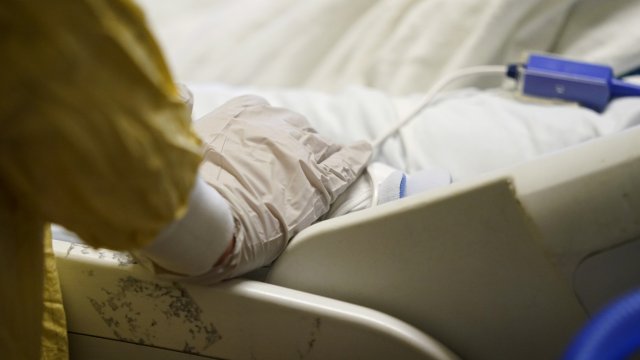A third of COVID patients identify as long-haulers, meaning they're having symptoms that last for weeks or months after a COVID infection.
New research shows the chances of getting long-haul COVID after a hospital stay for the illness can continue for several months.
This comes from a new study out of the U.K. The top line: Of people admitted to the hospital with COVID-19, 90% reported COVID symptoms five months after being discharged and only limited improvement after a full year.
Long-hauler Ian Varys and his parents stay in every Friday night and watch a movie. It's a low-energy activity — now pretty much all 12-year-old Ian can handle. He had to quit his favorite hobby, karate.
"All the kicking and doing all the push-ups and everything, it just, basically everything makes it worse," Ian said.
Now 16 months into long-haul, it's still a struggle.
"Conditions have not improved because of therapy or medicines or anything like that," Ian's dad, Jeff Varys, said. "Emotionally, we've been through a lot of frustration because there still isn't a lot out there for under 18."
Newsy first caught up with 37-year-old Patrick Malia this summer when he was more than 400 days into his long haul.
"My 5-year-old especially, he worries," Malia said. "His biggest concern is that daddy's going to die."
Now, he's almost two years in.
"It's just hard to navigate expectations," Malia said. "People have an expectation that I'm going to go back to normal, and I haven't yet and it's frustrating to people around me. People have known me for a long time. That's the hardest part."
Data on long-haulers is hard to find, even more so for younger patients.
"One of the things is difficulty concentrating, right, like brain fog," said Sindhu Mohandas, a pediatric infectious disease physician at Children's Hospital Los Angeles. "How do you define brain fog in a 1-year-old?"
Researchers and doctors are still searching for answers, trying to learn more about the who and why with patients who have a variety of symptoms, ranging from headaches and brain fog to fatigue and rapid heartbeat.
One study at Northwestern Medicine in Chicago found some difference in different age groups of long-haulers with neurological symptoms. Almost half of those patients who had a mild COVID case were younger — under 40. Those who were hospitalized and had long-haul months later had an average age of 55.
A recent Mayo Clinic report looked at the first 108 patients in their post COVID-19 care clinic. Women made up 75% of that group, with the median age of 46 years old.
"I graduated right before I got COVID, with a master's degree, and now sometimes I have to slow down and struggle to remember how to spell my last name," COVID patient Dawn Leifeste said.
Congress has pledged $1.15 billion over four years for the National Institutes of Health to study long COVID.
Nearly $470 million of that is already going to 30 U.S. research teams for a study called the Recover Trial.
Hospitals like Children's LA hope to enroll patients soon, and in some labs, viral pathologists look for answers.
Dr. Bruce Patterson, the former head of virology at Stanford University, is trying to find how to treat the disease, not just the symptoms.
"The other, more difficult part of designing a clinical trial is the fact that long-haulers' symptoms are so heterogeneous that coming up with a placebo group that matches the treatment group may prove to be very, very difficult," Patterson said. "I don't think there's going to be any one drug that will allow us to treat long-haulers."


